|
ENGAGING MEN AND BOYS IN ACHIEVING GENDER EQUALITY ( UK GOVERNMENT –UNDP-COBERM)
|
|
 
Innovation of this project was the improvement of social and referral services through sharing experience of using new international guidelines and models of multi-sectorial approach to service response through working with male perpetrators and creating first Rehabilitation (Counselling) Centre for Perpetrators “Discourse.
Multi sectorial approach to services to prevent and deal with domestic violence. Until now, efforts in Georgia and in conflict region to combat domestic violence were mostly haphazard and scattered. We implemented the best practices from Spain adapting them to the Georgian context.
 
Our primary focus on male perpetrators of domestic violence is also thoroughly new. By breaking the vicious cycle of violence through rehabilitation of men, we actually contribute to gender equality in Georgia and conflict region. Considered as partner Tbilisi Crisis Center for protecting Victims of domestic violence, which provide consultations addressing on different cases of abuse and referral for Georgian Rehabilitation Center for men ““Discourse”, sharing results of working experience of staff, stand for basis for creation of network and long lasting communications contribute to building confidence.
Another new approach is strengthened with our awareness raising campaign and the work with adolescents and running non-formal education at State University of Adjara and Kvemo Kartli colleges, wide spreading information to communities and establishment of new friendships and close relations among Georgian and youth communities living in conflict zone.
 
|
|
FIRST PERPETRATOR REHABILITATION CENTER
|
|

The first Center for Perpetrators “Discourse“ opened in Georgia
Currently, gender-based violence is a significant challenge in Georgia and society lacks the information for preventing GBV. One of the major ways for prevention and response to gender-based violence is working with male perpetrators.
A brief narrative of behavior correction from law and codes in Georgia
One of the purposes of the Law on Prevention of Violence against Women and / or Domestic Violence, Protection and Assistance to Victims of Violence is to facilitate the implementation of measures to correct the attitudes and behavior of perpetrators.
Measures to correct the abuser's attitudes and behavior according to the law includes - passing a compulsory training course on violent attitudes and behavior change;
A protection order is an act issued by a court of first instance (judge) in an administrative proceeding setting temporary measures for the protection of the victim. According to Article 10, Section 7 of this law, a protection order must provide the course of compulsory training for the abuser aimed at changing violent attitudes and behavior.
According to the first part of Article 12 of the same law, a protection order is issued for a period of up to 9 months. The specific term of its validity is determined by the court.
Article 20. Measures aimed at correcting the abuser's attitudes and behavior
 Measures to correct the abuser's attitudes and behavior include measures to change the abuser's violent behavior and his or her psychological and social assistance aimed at preventing the recurrence of violence and ensuring the victim's acceptance and responsibility for the abuser's violent behavior and consequences. To achieve the change , it is important for the abuser to take a mandatory training course focused to prevent violent attitudes and behavior change. Measures aimed at correcting the abuser's attitudes and behavior and the rules and forms of their implementation shall be determined by a resolution of the Government of Georgia. (The Government of Georgia has not yet developed this resolution). Measures to correct the abuser's attitudes and behavior include measures to change the abuser's violent behavior and his or her psychological and social assistance aimed at preventing the recurrence of violence and ensuring the victim's acceptance and responsibility for the abuser's violent behavior and consequences. To achieve the change , it is important for the abuser to take a mandatory training course focused to prevent violent attitudes and behavior change. Measures aimed at correcting the abuser's attitudes and behavior and the rules and forms of their implementation shall be determined by a resolution of the Government of Georgia. (The Government of Georgia has not yet developed this resolution).
The procedural details of the above-mentioned issues are regulated by the Administrative Procedure Code of Georgia.
In addition, according to Article 3811 of the Criminal Code, failure to comply with the requirements and obligations of the protection order is punishable by a fine or community service for one hundred and eighty to two hundred and forty hours or one year of imprisonment.
According to the practice in Georgia, working with abusers begins only after they enter the penitentiary system as convicts or probationers.
In 2018-2019, based on the Spanish model, a joint "Violence Behavior Correction Program" was launched in the system of the National Agency for Execution of Non-custodial Sentences and Probation and the penitentiary system.
However, according to the 2019 report of the Public Defender, this practice turned out to be quite fragmentary. The effectiveness of the Violent Behavior Management Program was also not assessed.
One of the major ways for prevention and response to gender-based violence is working with abusive men, women, child and youth on prevention, participation, protection, relief, and recovery .
Union Women Center with the support of UK Fund for Sustainable Peace - Complementary Initiative to COBERM, has opened first ever Behavior Correction / Rehabilitation Center - "Discourse" in Georgia. The center is a service institution established to implement measures to correct the attitudes of abusers and behavior, which aims to provide psychological and social rehabilitation to the center's service recipients before they go to the prison or under supervision of National Probation Agency.
The working structure of the Perpetrator Center in Georgia, Tbilisi in particular, is based on cooperation with the Crisis Center, hotlines, social services, probation and penitentiary systems, which provide information about the perpetrators and offer our services to them. The standards of the Tbilisi Perpetrator Rehabilitation Center are based on an effective multi-sectoral approach based on the international standards of the European Perpetrator Network, which is based on guidelines and effective coordination with social service providers and law enforcement agencies.
The model of Behavior Correction / Rehabilitation Center - "Discourse" was designed based on the legislation of Georgia and it provides following services to perpetrators men, women, children, and youth:
- The center is working in coordination with Tbilisi Crisis Center providing assistance to women and children, with social agencies for the Protection of Victims of Domestic Violence, with National agency of crime Prevention and Probation system;
2 .Hotline, on-line and face to face consultations for legal, psycho-social treatment for perpetrators;
- Working with young people to change attitudes towards gender based violence at university level;
- Working on community level to raise awareness about perpetrators center and importance of working with men to prevent GBV.


|
|
PREVENTING VIOLENCE AGAINST CHILDREN AND YOUTH ( EU – UNDP – COBERM )
|
|
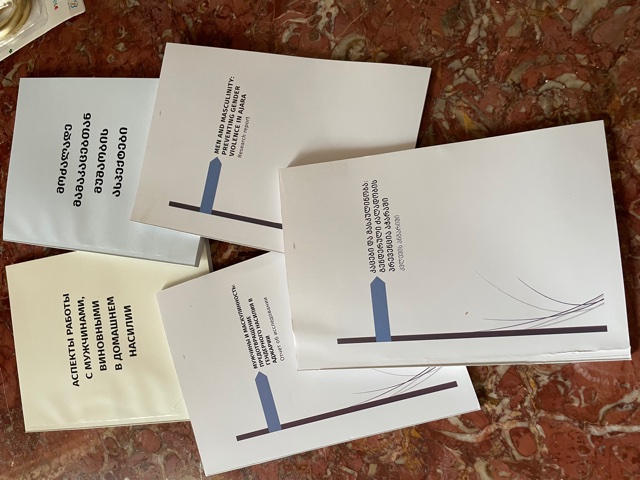 The project has made substantial progress and contribution in building cooperation and networking among professionals and NGOs towards the eradication of the problem of preventing violence and trauma in children and young teenagers. The intervention engaged specialists, parents, children, youth and potential victims of child abuse, with the aim to improve social and referral services. Teenagers involved in a series of psycho educational exercises, such as: Emotional and stress management, self-regulation and self-confidence, empathic inter-personal relations, detecting the hidden forms of domestic violence by art therapy method on the level of kindergartens, identification and response. Conducted social research concerning gender and masculinity. Invited experts from the European Network for the Work with Perpetrators of Domestic violence (WWPEN) share their experience of working with perpetrators, programs, strategies, guidelines in conditions of pandemic, organize virtual visits to the Perpetrators Centers , Children Crises Centers existing in Europe. In the framework of the project was published a survey as a book “Men and Masculinity: Preventing Gender Violence in three languages (Georgian, English, and Russian). Short video-clip about the work done by UWC in the frame of COBERM projects and future plans. Publishing book based on WWPEN materials “Aspects of Working with Men Perpetrators of Domestic Violence” in two languages (Georgian, Russian). The project has made substantial progress and contribution in building cooperation and networking among professionals and NGOs towards the eradication of the problem of preventing violence and trauma in children and young teenagers. The intervention engaged specialists, parents, children, youth and potential victims of child abuse, with the aim to improve social and referral services. Teenagers involved in a series of psycho educational exercises, such as: Emotional and stress management, self-regulation and self-confidence, empathic inter-personal relations, detecting the hidden forms of domestic violence by art therapy method on the level of kindergartens, identification and response. Conducted social research concerning gender and masculinity. Invited experts from the European Network for the Work with Perpetrators of Domestic violence (WWPEN) share their experience of working with perpetrators, programs, strategies, guidelines in conditions of pandemic, organize virtual visits to the Perpetrators Centers , Children Crises Centers existing in Europe. In the framework of the project was published a survey as a book “Men and Masculinity: Preventing Gender Violence in three languages (Georgian, English, and Russian). Short video-clip about the work done by UWC in the frame of COBERM projects and future plans. Publishing book based on WWPEN materials “Aspects of Working with Men Perpetrators of Domestic Violence” in two languages (Georgian, Russian).
.jpg) .jpg)
 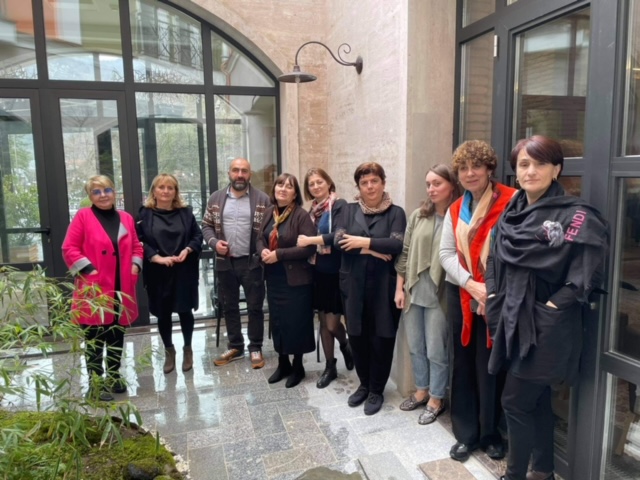
|
|
MANUAL -IDENTIFICATION OF HIDDEN FORMS OF DOMESTIC VIOLENCE IN CHILDERN ( WOMEN FUND OF GEORGIA)
|
|
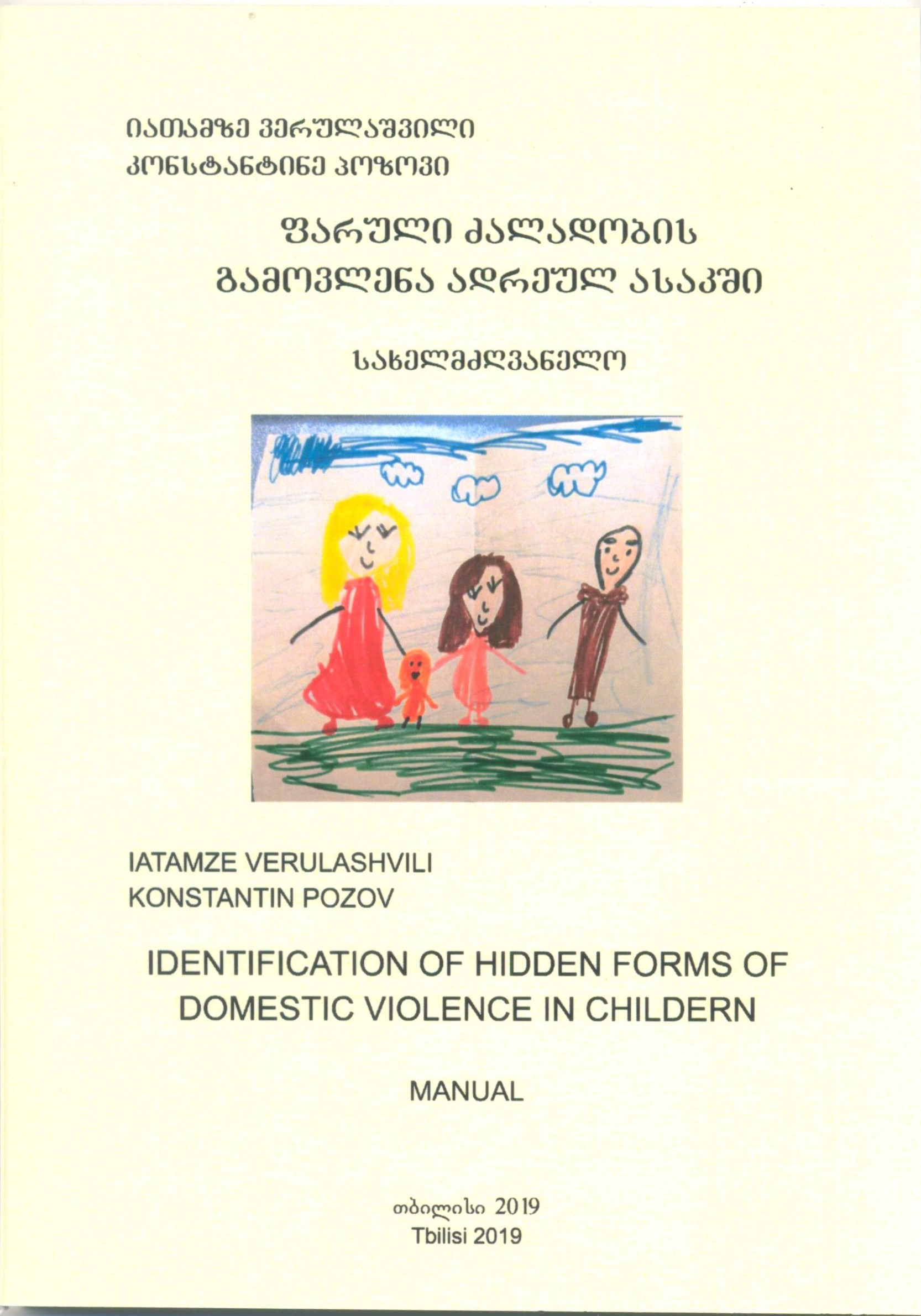 In the manual are presented international and Georgian statistical data. The manual contains art-therapeutic methodology of uncovering hidden violence at tender age, and is meant for social workers and education specialists, and also for all interested persons for whom it is important to bring up and protect next generations from violent environment. Here are presented contemporary research based methods for discovering and uprooting violence, according to internationally acknowledged standards and regulations. Information contained in the manual will help to learn about domestic violence and its impact on young children; recognize the signs that children may display when they are having difficulties. These signs may occur for a variety of reasons, including domestic violence; learn ways to support children and deal with challenging behaviors; offer support and information about resources to parents who may be adult victims of domestic violence. Early identification of cases of child abuse and neglect, early preventive mechanisms at the kindergarten level, revealing the hidden forms of domestic violence through child observation and referrer will be bases in yearly stage reveal and response to the violence in the family . |
|
PREVENTION VIOLENCE AND CONFIDENCE BUILDING AMONG PROFESSIONALS (UNDP-COBERM)
|
|
The project contributed to developing cooperation and networking among women professionals for the eradication of gender-based violence and promoting gender equality. The project brought together professionals and facilitated capacity building and experience exchange towards developing strategies for multidisciplinary responses, shelter and crisis center operations, and identification of domestic violence survivors, as well as providing them with access to hotlines, medical treatment, psychological support, and legal services. Part of the project was directed towards solving the problem of discovering and responding to cases of domestic violence in Georgia, especially in Guria region, as well as defining the roles and responsibilities of municipalities. To improve the situation with prevention and response, a multispectral response group was created bringing together police, social workers, doctors, municipality representatives, and NGO workers in Chokhatauri, Lanchkhuti, and Ozurgeti. The group acquired skills in domestic violence prevention at the community level, victim protection, hotline and crisis center operations, and the organization of psychological and medical service centers. As a result of information exchange, close cooperation was established to deal with ongoing common challenges, gaps, and ways of jointly addressing shared problems and working together to combat domestic violence.



Elements of effective collaboration between domestic violence advocates and health care providers through new curriculum in Post-Graduate Medicine Programs
Was created new course by special program for licensing and re-certification for health care providers, development Domestic Violence Medical Resource Manual and develop an effective health resposponce to domestic violence. Training health care providers in 4 hospitals were most often applying victims. Organize round table with head of department of hospitals and discuss the way of implementation screening program.
The purpose of special course is to provide accessible information to health care providers in regards to advocacy and treatment of patients who have experience domestic violence. Because effective advocacy and treatment can only occur if the health care providers has a thorough understanding of the complex dynamics of DV, information regarding victim safety, power and control tactics and community resources.
New course “ Impact domestic violence on reproductive health” was approved by the Ministry of Health and Social Affairs on 6 September 2006 as certificate program for postgraduate training for doctors, registration number of program N 2006001, duration training 5 days, fees which doctors pays for course $15, after accomplishment course doctors receive 25 credit scours (to receive permeation to work as doctor need during year to collect 75 credit scours).
Five days training modules for health care practitioners who work in primary care, obstetric /gynecologist.

These training are designed to provide the information needed for changes in the practice of both individual clinicians and health care system.
Creation Medical Center
On the bases of Women’s center was created medical center EUROMEDCENTER”
(http://www.euromedcenter.org.ge). In the Center works medical staff which is trained on how to work with victims of Domestic Violence, Trafficking. Center provide professional help to victims of domestic violence, consultation and treatment, screening on domestic violence pregnant women .In the Center we provide training and re-qualification of professionals on
- Climacteric Syndrome – diagnostic and treatment ( 25 credits )
- Hormonal Disorders in Gynecology (25 credits)
- Impact of Domestic violence on reproductive health – (25 Credits )
- Impact Domestic Violence during pregnancy on Child and Women Health
Psychology and Social Responsibility Facing Violence
 The workshop was a part of long-term strategic approach to prevent domestic violence through education and increase awareness of this problem among regional coalition group, Women’s Leadership Coalition group ,among the women at the decision-making level in Parliament, in government and in political parties, in governmental structures. There was a training lead by the trainers from School for International Training - Dr. Paula Green., Dr Olivia Drier-USA (OSCE/ODIHR -Gender Unit - Karuna Center) The workshop was a part of long-term strategic approach to prevent domestic violence through education and increase awareness of this problem among regional coalition group, Women’s Leadership Coalition group ,among the women at the decision-making level in Parliament, in government and in political parties, in governmental structures. There was a training lead by the trainers from School for International Training - Dr. Paula Green., Dr Olivia Drier-USA (OSCE/ODIHR -Gender Unit - Karuna Center)
"CHALLENGES TO GENDERS BASES VIOLENCE PREVENTION IN NEW GENERATION"
Virtually every women visit some form of health professional at some point in their life. The health care sector can be very important part of the help seeking process for women experiencing violence. Women may seek medical help for the consequences of domestic violence; they may also be in routine contact with the health service. Health professionals who will most often encounter survivors of domestic violence include: gynecologist, psychiatric, cardiologist, pediatricians, neurologist, family doctors. The injuries sustained from physical violence have clear health effects for victims.

|
|
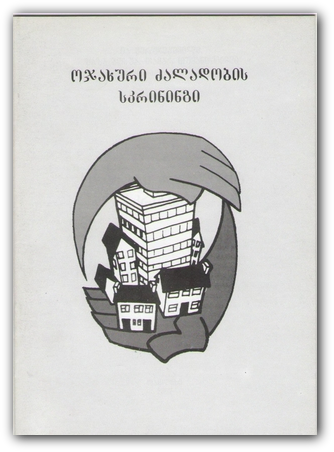 1. BOOK Screening on Domestic Violence
Present Screening manual the best possible way to identify abuse. In this manual we offer a screening model according to which every women in every medical department will be screened in routing care according to a special screening form In case of revealing any symptoms and signs of disease related to domestic violence,the patiens should go through of comprehensive screening according to an addition screening forms comprising all fields of medicine. Manual are created on the bases of material and consultations of Family Violence Prevention Fund USA and Ministry of Health and Social Affairs of Georgia 1. BOOK Screening on Domestic Violence
Present Screening manual the best possible way to identify abuse. In this manual we offer a screening model according to which every women in every medical department will be screened in routing care according to a special screening form In case of revealing any symptoms and signs of disease related to domestic violence,the patiens should go through of comprehensive screening according to an addition screening forms comprising all fields of medicine. Manual are created on the bases of material and consultations of Family Violence Prevention Fund USA and Ministry of Health and Social Affairs of Georgia
2. Creation Guidelines for Health Care Providers on Medical Screening for Cases of Domestic Violence in Georgia
The main goal was the creation of a universal screening manual which would be the best possible way to identify abuse. Activities included creation of clinical guidelines on routine screening; Develop screening policy and training on these skills prior to implementing screening in medical records; screening form was created with representative Ministry of Health and Social Affairs
Screening model consist of two steps. according to which, every women in medical department will be screened in a routing care according to special form. First step
VALIDATED ABUSE
ASSESSMENT TOOLS
ABUSE ASSESSMENT SCREEN
1) Have you ever been emotionally or physically abused by your partner or someone important to you?
Yes □ No D
If yes by whom? ___________
Total number of times ___________
2) Within the last year, have you been hit, slapped, kicked or otherwise physically hurt by someone?
Yes □ No D
If yes by whom? ___________
Total number of times. ___________
3) Since you've been pregnant, have you been hit, slapped, kicked, or otherwise physically hurt by someone?
Yes □ No D
If yes by whom? ___________
Total number of times ___________
4) Within the last year, has anyone forced you to have sexual activities?
Yes □ No D
If yes by whom? ___________
Total number of times ___________
5) Are you afraid of your partner or anyone you listed above?
Yes □ No D
MARK THE AREA OF INJURY ON A BODY MAP AND SCORE EACH INCIDENT ACCORDING TO THE FOLLOWING SCALE:
If any of the descriptions for the higher number apply, use the higher number.
1 = Threats of abuse including use of a weapon
2 = Slapping, pushing; rib injuries and/or lasting pain
3 = Punching, kicking, bruises, cuts, and/or continuing pain
4 = Beating up, severe contusions, burns, broken bones
5 = Head injury, internal injury, permanent injury
6 = Use of weapon; wound from weapon
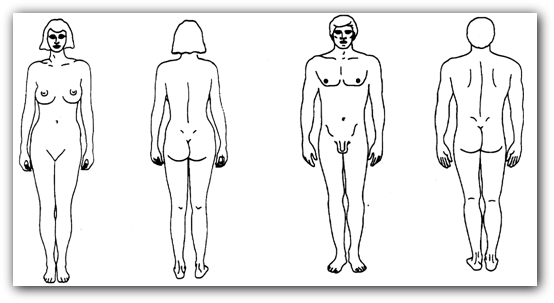
Second step - In case of revealing any symptoms and signs of the of disease related to DV, the patients go through of comprehensive screening according to additional screening form comprising all the fields of medicine.

|
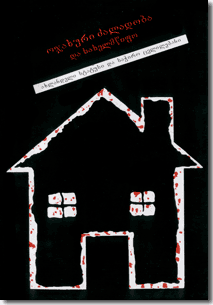 |
In 2004 we re-printed a book “State Responses to Domestic Violence Current Status and Needed Improvements” in Georgian language, which became a handbook for NGO’s working on Awareness of Domestic Violence among regional health care providers and creation education and health consulting center.
The book provides recommendations for the measures, ways and means of elimination of violence against women and its cases at national, regional and international level. Also it is intended to serve as a resource for both governmental and NGOs around the world to use in advocating specific changes in the treatment of domestic violence within their country‘s legal system. In addition to outlining the international human rights instruments that support the obligation to adopt domestic violence legislation, the book includes direct input of women working in the field of the domestic violence worldwide, and as such provides an important vehicle for women’s voice to be heard at the highest level of UN system.
|
|
|
We are the first in Georgia to work on awareness of domestic violence among health care professionals through the training of 300 physicians from 20 medical institutions in Tbilisi.
Following the project we have created recommendations for Ministry of Health which includes 3 steps of prevention:
I step - Primary prevention to reduce risk-factors. From this point doctors can reveal the cases of violence against children, to take care of the children of victims, because the main risk-factor for becoming abusers in adulthood – is to live in the violent environment.
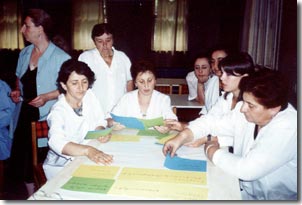 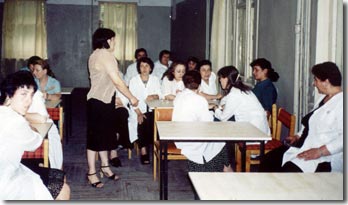
II step - Secondary prevention includes early recognition of domestic violence cases and “treatment”.
It includes: identification, providing appropriate medical care, documentation, assessment of safety, referral to the police or other institutions that work on the problem of domestic violence.
III step - Tertiary prevention includes giving victims of domestic violence necessary supporting and rehabilitation measures for reducing trauma and restoring the quality of life. The doctors must take part in all of these three levels.
(OSCE / ODIHR)
|
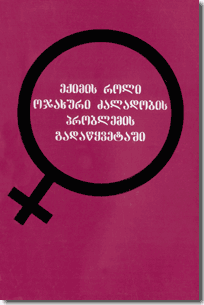 |
A manual of doctors was prepared and published as a book “Domestic Violence: The Health Sector Responds”.
The book gives basic knowledge about domestic violence, contains discussions on this problem and on its importance to health care professionals, since domestic violence negatively impacts on health. Abused women have poorer mental and physical health, more injuries, and a greater need for medical resources than non-abused women. Health outcomes of domestic violence has been associated with chronic ailments, psychological consequences, injuries, death, reproductive health risks and problems such as: unwanted pregnancy, sexually transmitted infections (STIs), including HIV/ AIDS, pregnancy complications, miscarriage, stillbirth, low birth weight, gynecological disorders, etc. The children of battered women are heavily affected, either by direct violence or by witnessing the violence against their mothers. Those children are more likely to suffer from learning, emotional and behavioral problems. Also they are at increased risk of becoming abusers and of being abused later in life.
|
|
|
Physicians can play a crucial role in detecting, referring and caring for women living with violence. Unfortunately, physicians frequently treat only the symptoms of battered women’s injuries. Most battered women who are seeking medical attention are sent home to the same unsafe situation that was the original cause of their injuries only because of the physician’s lack of appropriate training to support, identify and, treat the victims of domestic violence.
The main aim is to raise awareness of domestic violence among physicians, to improve health professionals clinical skills on how to appropriately screen domestic violence, document domestic violence in the medical records, assess patient’s safety and develop a safe plan how to refer victims to domestic violence.
The material in the book is based on up-to-date literature and international experience.
|
|
Health-care professionals are often the first to contact the women suffering from the effects of domestic violence. Therefore, they need a guidance to develop a pragmatic and sensitive approach to recognise the signs of domestic violence and care of victims
The goal of the project was:
- To create Educational and Health Care Consulting Center, where trainings for health care professionals dealing with Domestic violence would be held. The trainings would be organized in 4 regions of Georgia: Mtxxeta-Tianety, Shida-Kartly, Kvemo Kartly, Satsxe-Dzavaxety where works Anti-Violence Network for health care providers.
- To develop a multidisciplinary and co-ordinates co-operation involving NGO, local authorities, judicial, law endorsement and migration authorities.
- To organize round tables in Tbilisi for health care providers, policy makers, hospitals, trainings for Parliament and Ministry of Health representatives.
- To train 163 health care teams in Mtxxeta-Tianety, Shida-Kartly, Kvemo Kartly, Satsxe-Dzavaxety i.e. general practitioners, gynaecologists, obstetricians, psychiatrists, surgeons and nurses.
- For the first time in Georgia with the support of OSCE-ODHR the victim women can get free Ultrasound examination, doctor consultation and laboratory test on STD and so on.
In the Centre works a Hot Line. One-to–one counselling provides an opportunity for people to talk through problems with counselling. Counselling is not advice-giving, but it enables people to talk about their feelings and explore their concerns with someone ready to listen.
We organized a Round Table - ”Elements of effective collaboration between domestic violence advocates and health care providers and governmental representatives”, the goals of which was to bring together the head of hospitals and ambulances (where we held trainings) and representatives of Ministry of Health, Parliamentary and also representatives of International organizations which work on Reproductive Health Problems to share our experiences, give our recommendations for implementation and creation of corporation with them.
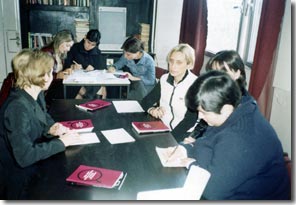 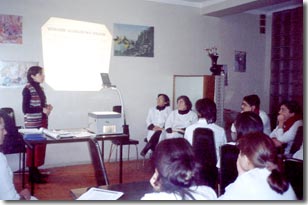
Achieved Results
First in Georgia:
- Raised a problem of domestic violence among health care providers in 4 regions where works Anti-Violence Network.
- Created training center for doctors
- Created medical consultation and examination center for victims
- Created hot-line for medical consultation
- Women’s Center is ready to conduct ultrasound examination
- In the Women’s Center we set up biochemical examination
- In the Women’s Center we can treat neuroses
- Established corporation with the head of hospitals and ambulances where we held trainings with representatives of Ministry of Health, Parliamentary and also representatives of organizations.
Recommendations
- Developing and implementing public health-domestic violence awareness/education campaigns.
- Domestic violence trainings for health care providers in regional parts of Georgia.
- Develop a comprehensive training manual and offer training workshops around the country to help doctors, nurses, medical students.
- Perform active lobbying on behalf of increased funding for DV women's services and strengthened health policy response on the local, national and international level.
- Create 15 hour credit program for family doctors, gynecologist, therapeutic, neurologist, pediatricians which will be new vision of this problem.
- Develop protocols for screening abuse; develop procedures for complete documentation of battering in the medical record; make use of domestic violence referral lists.
- Lobbying Ministry of Health to implement domestic violence screening standards in all hospitals.
- Formed network of organization where victims can get assistance.
- Implemented domestic violence standards and required all hospital departments to have the following in place:
--written domestic violence protocols specifying the scope and conduct of patient care (including objective criteria for identifying and assessing possible victims of abuse, and policies and procedures that define the hospital's responsibility for collecting, retaining, and safeguarding information and evidentiary material);
--plan for educating staff about domestic violence identification, treatment, documentation; and a list of private and public community agencies that provide help for abuse victims.
- Set-up certificate and credit-hours program in the postgraduate training system
- Negotiated a process of creation of educational program for doctors which gives them possibility to receive full information about the pathology which is the reason of DV and the ways of its treatment.
- Counseling services for men who batter. Developed a therapy method and counseling services for men who batter.
- Women’s support (self-help group) - place where they will connect and interact, where they hear about others struggles, and where their witness effective change and where they get consultation advises
- Established domestic violence resource center. The center serves as a professional library for information DV. The center will be meeting place for doctors, NGO’s representatives and central clearinghouse for dissemination information and publications on DV.
- Established Close Corporation with Ministry of Health includes them in implementation program.
- Established close corporation with Parliament.
|
 |
We prepared and published a book: “Medical Aspects of Domestic Violence”.
|
|
|
|
|
|




 1. BOOK Screening on Domestic Violence
Present Screening manual the best possible way to identify abuse. In this manual we offer a screening model according to which every women in every medical department will be screened in routing care according to a special screening form In case of revealing any symptoms and signs of disease related to domestic violence,the patiens should go through of comprehensive screening according to an addition screening forms comprising all fields of medicine. Manual are created on the bases of material and consultations of Family Violence Prevention Fund USA and Ministry of Health and Social Affairs of Georgia
1. BOOK Screening on Domestic Violence
Present Screening manual the best possible way to identify abuse. In this manual we offer a screening model according to which every women in every medical department will be screened in routing care according to a special screening form In case of revealing any symptoms and signs of disease related to domestic violence,the patiens should go through of comprehensive screening according to an addition screening forms comprising all fields of medicine. Manual are created on the bases of material and consultations of Family Violence Prevention Fund USA and Ministry of Health and Social Affairs of Georgia